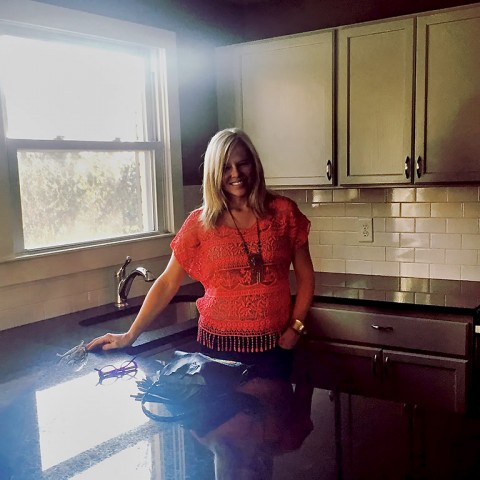 Nashville, TN – For Rent: I saw the photo of the little cottage house kitchen flashing at me from the screen of my Ipad. It had a warmth I could feel from its vintage 1947 age, but was renovated smartly with granite counters and white painted cabinets.
Nashville, TN – For Rent: I saw the photo of the little cottage house kitchen flashing at me from the screen of my Ipad. It had a warmth I could feel from its vintage 1947 age, but was renovated smartly with granite counters and white painted cabinets.
There was a window above the sink that looked out to a yard (always a rule for every house I’ve ever lived in) with streams of light shining in, and it was there I could see the tree. Thick, old, and jutting up grandly, ignoring the busy road with cars gliding by frequently, and casting shade on the “tear-down-turned modern house” that was going up next door.

I’d been happy living in downtown, Nashville for the past three years (no yards in sight) and had become a regular here. And though at first when I moved to my current apartment, I missed Printers Alley deeply (the color, the sounds, the music lifting up from the pavement and into my windows), I had made a certain peace with my place.
When it came time to renew the lease for another year—something I never thought I’d do—I did.
But something called to me that day I randomly flipped through the home ads. Mystical, portent-filled signs had been revealing themselves to me for a few weeks, and I had yet to figure them out. Dreams. Birds flying into me hard at the riverfront. And scriptures read in church that seemed to be speaking directly to me.

Mishaps large and small at my current place didn’t help (my car being booted at 5:00am when I needed to get to the airport because I’m little more than a number on an access pass) and an often hollow, discontent at seeing a tree and grass outside my window, but knowing I was not allowed to touch it. (Rules. Another thing I’m not too keen with.)
I’d had these times of premonition before. Deep, vivid dreams usually are the first sign, and then I’m given clues like random puzzle pieces that don’t seem to fit with reality. Usually, it means a new reality is about to begin.
The Ipad flashed again. I’m not sure I noticed at that moment that the tree was exactly the same size, width, and height of the tree back home on Redstone Lane in Pennsylvania. The one that had a tire swing strung to it when we arrived, and which remained tied there until realtors asked us to remove it to sell the home. It was the tree of the “forever house,” as I had called it in my last column where I wrote about the home in detail, and it was as endlessly wide as my love for that place.
I called the number on the listing. I sent an email. It was just a photo, but something intangible was drawing me in. It wasn’t just the tree. Was it the storybook, yellow painted brick front with the stoop and little walkway leading to and from it? The hardwood floors (ah warmth under my feet and not cold concrete!), or the fact that along with extra space and a desperately needed second bath for family and guests, that it had a “mudroom?” A seriously old-fashioned concept (cue the hum and smell of laundry drying), a mudroom is definitely “grandmother house” evocative.
Funny, but I’d always said the Redstone address had aspects of a “grandmother house,” and because I had never known any of my grandmothers, I clung to that premise maybe a little more tightly than others might. It was more a feeling of timeless permanence, I suppose.
As spring and summer wore on, they’d begin to droop and shed smears of petal paint on the concrete and grass in a tumble-down spray. And there was something of dignity in that too, the task of their dazzling glory done, and the time of bending down inevitably to the ground arriving. But there was nothing as joyous as those first blooms.
It was just about that time that I made my first and next to last trip back home. I knew there were things on the street that would have stayed the same. The cats of my neighbor’s. The dogs of the other, prancing in the manicured large lawn across the street. Perhaps a basketball bouncing down the path, or a stray car turning around. (It was a dead end street, except for those proceeding on to the other hidden houses down a narrower lane.) I secretly also hoped that perhaps my cat, Mario, who had run away while I was gone one too many weeks, would be there hiding in the backyard shed as he sometimes did.

When I arrived and pulled up in the car, the peonies were there. Lawns were mowed and the same light and shadows played in the morning sun as I remembered them. But inside, I reminded myself, would be the “renters.” Since the house hadn’t sold, it was determined that the home should be rented, rather than sit there empty, and that there would be some obvious benefit to this.
Paying the mortgage was the one I could think of. They were also supposed to be handy and “fix things” that might go wrong. But nothing prepared me for what it would be like to ring my own front door bell, and stand there, hands in pockets, waiting for someone to answer.
I entered the foyer and exchanged pleasantries. There was an assemblage of individuals in the booming oil and gas business from Texas living there, and working as local “land men” at one of the many natural gas fracking sites.
When the door opened, I could see the living room I’d painstakingly designed over the years with my favorite fabrics and shabby chic French chairs, sporting a treadmill (transported from the upstairs guest room?) and a playpen in the center of it. A baby’s blanket on the floor with toys was next to it. Pacifiers, walkers for the older toddler I could see running about, dolls and coloring books were strewn around the “family room,” and the TV, which we had rarely turned on and never during the day, was blaring some loud commercial between daytime soap operas.
Everyone in the house did an awkward dance. There were three men living there, of which I’d just met two, plus the wife and kids of one of them who came up to stay on extended visits. We all forced friendliness as the group scattered about to tidy up the other rooms before I got there. “Don’t worry about it!” I lied. Who was I to have a dislike for babies and clutter? But at that moment I stifled the pangs in my stomach and reminded myself of my mission to simply collect books and some key items I’d like for my apartment back in Nashville.

I’ve said this before, but at that moment and at others in my life, it has born out to be true: whenever I’m deprived of “home,” it is the familiarity and significance of books and artistic objects (in my case paintings by friends, or decorative items that have worn well) that I miss the most. Even today I can feel a stirring of longing at seeing a seemingly small accessory like a lamp that reminds me of home. It’s not the “materialness” of the “thing,” but rather the sense of home that can be conjured up in a tactile way.
“I’ll just go in the office for a bit and look for my stuff,” I announced. The hideaway room appeared to be untouched for the most part. It would be a boring room for a child, filled only with adult books, and a fireplace. I stepped inside and closed the door from the chaos around me. I could hear the scurrying around in the other rooms, and a faucet in the kitchen start up with the clanging of dishes as they continued the clean up dance.
For a moment, flashes of the nights spent there in the office, tending the fire and writing into the a.m. for some assignment in my MFA program, came back to me—the little, half drunk wine glasses or coffee cups perched on the edge of my desk before I’d fallen asleep. The woman there, who was a wife, mother of two, writer, and non-profit arts professional had sat in that little loveseat by the window and looked out in the mornings with coffee to the deer lazing in the backyard, just as I could see the deer gallop past that day.
But I was not the same woman I was then. I squinted to try to see her more closely, standing there, and perhaps lifting a book from the shelves. But the image was fleeting. The house wasn’t mine anymore, though on some deed, somewhere in the vast files of the county clerk’s office, there was a signature with my name on it.
I moved on to the upstairs; there was something I wanted to retrieve from the guest bedroom. It was a favorite room of mine as it had long rows of nearly new pine flooring (when we lifted up the carpet after moving in, we found it had never been walked on.) I climbed the stairs and proceeded to head in alone, I thought. But when I got to the end of the hall, the door was half closed.
I could sense someone was inside. When I opened the door all the way I saw a handsome black man, smiling ear to ear, and sitting at a makeshift desk, with a computer and printer. He was working. The bedroom was now an office? Behind him was a nearly bare mattress, with a comforter strewn on it, even though my wrought iron guest bed stood unoccupied at the other end of the room.
I turned it over in my head. I smiled back a bit too eagerly, not wanting to seem surprised that my guest room where all the family photos and scrapbooks were housed, where my best friend had once stayed during a rough patch in her early twenties, where the long closets made a great hiding place for Christmas presents each year, was now this man’s work abode. Smiling a bit too brightly, I extending my hand and shook his as he too made gestures to straighten the bed and pick up a stray damp towel.

I told him not to worry himself, that I was just going to be a second and look for something that I’d been missing for some time. It was a book, actually a literary journal, I had been searching for it as a key part of the memoir I was then writing back in the alley. It dogged me that I could not find it as the journal was out of print and not easily secured.
I wondered around the room aimlessly. I thought later how the whole scene was like a dream someone would have, not real. I could hear myself telling it to anyone who would listen: “It was a weird dream, see: I was in my house, but other people were living in it—there was a baby, a child, a mom, and three random men in all of the bedrooms, and the guest room was an office for one of the guys…..”
Nothing was in its same place but I acted composed, walking slowly from one bureau drawer to the next, to the insides of boxes. No luck. I opened my closet doors; it wasn’t time to be moving all of the things out and so opening them, I realized immediately, was a mistake.
There in front of me were remnants of my old life: cocktail dresses and floor-length gowns I’d worn for fund-raisers and art center events. The orphan clothes stared back at me as though I could rescue them, but I was little more than a helpless intruder, who had no place to take them to. (I had little closet space in Nashville and couldn’t imagine one place I could wear them.)
I’d been in the house I loved for hardly one hour, and yet I was overdue to leave. I walked the boxes of books, a few knick-knacks, a few smaller paintings, and notebooks to the car. I filled the trunk and turned around to see my neighbor standing behind me. He’d snuck up on me. By accident, of course, but it made me startle. We hugged.
It was then that the tears came. Not inside, but out in the fresh Western Pennsylvania air, where I gulped heavily and exhaled into my tight throat. All around me, the sounds were so normal: the hums of far away mowers, dogs barking from open garages, and maybe the choruses of some school children walking home. “A little rough?” he asked. “Yes,” I said.
The renters didn’t last long. I heard they left in the middle of the night, taking their playpens and crayons, and extra mattresses, and foldaway desks. I did get to go back to the house one last time, however, and had a much more satisfying goodbye. The realtor had helped us contract with people to paint, repair and fix-up from the nearly two years of emptiness and rental handling.

It was in impeccable shape those last two nights I stayed. I relished in fresh sheets and laundered comforters. I took in the sight of favorite patterns in the wallpaper of the bedrooms, and even took some pictures in the yellow bedroom light. At night, I filled the oversized tub with water and drank a glass of wine.
The next day I puttered around the rooms, taking a few more things here and there, and writing down an inventory for the day everything would be loaded on a truck and divided, setting off in two divergent directions on the interstate.
But there was a peace that time. Hardly any tears. The nearly 110 year-old house was restored in my mind to what it had been. It had its pride, its sense of home. It would now be a home, in the best sense of the word, for someone else.
Since that time, I have mused and wondered over the meaning of all things “home,” and the meaning too, of exile. I have avoided simple clichés like “home is where the heart is,” though it is, of course, true, that one can create a haven of home with a loved one with very little.
Once, a contractor from the country walked into my living room and said “now this is home.” It made me feel like I had won something. That this man appreciated what I had tried to accomplish with rudimentary things: fabric, paint, wood grain, and art. I wasn’t trying to impress a prince with my place, I realized, but achieve this one elusive thing—and standing there that day in my house, at that one point in time—a man I respected for his simple integrity had proclaimed it as such.
Yes, a home can be a block or street. Neighbors. Family, of course. Or, a corner of a house known only to you as a place of escape that incites a re-thinking of the world.

And it can sometimes be light: shadow, and a more intangible feeling of all of these things adding up to a sum greater than the parts. We all know when we’ve walked into a place that is not aligned with our being or soul in some way. We are uncomfortable. We want to get out. We tolerate the space, but cannot spend time there.
And so I have recognized that time for me. To close a chapter on downtown Nashville, and open another one on the east side of town, lovingly known as “East Nash” where there is still urbanity (shops, cafes, bars, music) but also neighborhoods with houses with character, and of course the little storybook cottage one I’m risking a lot for (read; bound by lease here) to move into next month. But it’s a chance I have to take, I figure. It’s not just any house; it feels like home.



